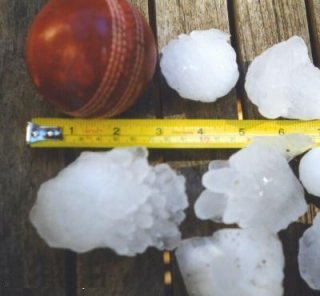The 1999 Sydney hailstorm was the costliest natural disaster in Australian history, causing extensive damage along the east coast of New South Wales. The storm developed south of Sydney on the afternoon of April 14, 1999 and struck the city's eastern suburbs, including the central business district, later that evening.
The storm dropped an estimated 500,000 tonnes of hailstones in its path. Insured damages caused by the storm were over A$1.7 billion, with the total damage bill (including uninsured damages) estimated to be around A$2.3 billion, equivalent to US$1.5 billion. It was the costliest in Australian history in terms of insured damages, overtaking the 1989 Newcastle earthquake that had resulted in A$1.1 billion in insured damages. Lightning also claimed one life during the storm, and the event caused approximately 50 injuries.
The storm was classified as a supercell following further analysis of its erratic nature and extreme attributes. During the event, the Bureau of Meteorology was consistently surprised at the frequent changes in direction, as well as the severity of the hail and the duration of the storm. The event was very unusual, as the time of year and weather conditions in the region were not conducive for a severe thunderstorm to form.

Previously selected articles: Surface weather analysis, Snow in Florida, More...